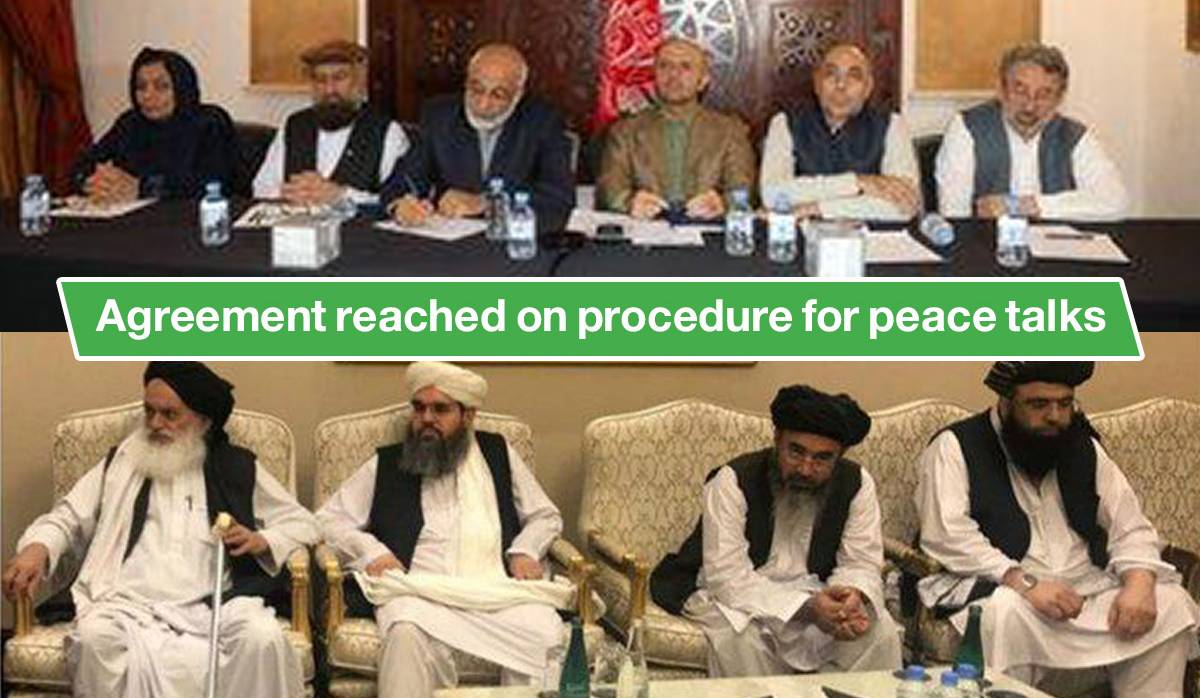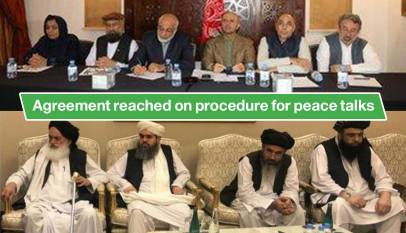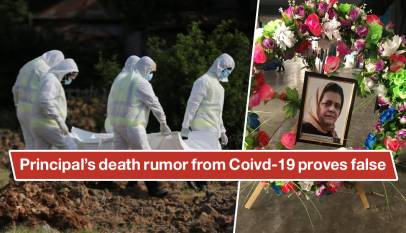Agreement reached on procedure for peace talks
KABUL (Pajhwok): An agreement between the Afghan government and the Taliban negotiating teams reached on ‘Procedural Rules’ on Wednesday and a joint statement in this regard will be announced today, Spokesperson of the Government Negotiating team Nader Nadery said.
Nadery told Pajhwok Afghan News that agreement included the preamble and discussion on the agenda would begin.
Peace talks in Qatar suffered deadlock recently and a special UN envoy had arrived in Doha to meet representatives of the two sides and break the deadlock.
A member of the Afghan negotiating team in Qatar told Pajhwok Afghan News that Procedural Rules between the two sides had been agreed upon and a joint statement will be released today.
Earlier, well-placed sources told Pajhwok Afghan News the government wanted to delay approval of the agreement until the new US administration’s inauguration.
But a presidential spokesman vehemently denied Ghani would delay the peace talks. Instead, he insisted, the president was working for progress in the negotiations.
The UN special envoy for Afghanistan, meanwhile, has arrived in Doha to help break the deadlock over the procedure for the peace talks.
A peace agreement was signed between the US and Taliban in Doha on February 29. Under the pact, 5,000 Taliban prisoners and 1,000 government inmates have been released.
It was agreed under the Doha deal US troops would leave Afghanistan within 14 months of the signing date.
Disagreements over modalities for talks erupted when the Taliban called the US peace deal and Hanafi jurisprudence the basis for talks. But the government delegation opposed the Taliban view.
Disagreements over this and other issues led to a two-month delay in discussions on modalities. Meetings between the two sides are not being held on time.
Different sources have come up with different views about the agreement on procedure. Taliban and some other sources say the negotiators had agreed on 21 articles so far.
Nader Nadery, a member of the government team, said last week they had agreed on the procedure. For clarity sake, further discussions were needed on the issue.
However, a presidential spokesman insisted said no progress had been made so far. He insisted the global fraternity supported the peace dialogue, which could not be stalled by differences.
But Hafiz Mansoor, another member of Kabul’s negotiating team, said last week that principles for peace talks had been agreed on and would be shared with the public soon.
He said: “The world supports peace talks and opposition from the government cannot stop these negotiations.”
Two sources in the High Council for National Reconciliation also confirmed to the BBC the negotiating teams had agreed the US-Taliban deal, demands of the Afghan people, commitment of both sides and UN calls would be the basis for talks.
They said differences over Shariah interpretation would be resolved by ulema from both sides, if needed.
Mohammad Naeem, spokesman for the Taliban’s political office in Qatar, told Pajhwok Afghan News the 21-article procedure for peace talks had been agreed in mid-November. “Nothing is left, the entire procedure has been agreed upon.”
He tweeted: “The procedure was read out in the presence of the host country on November 17. After approval from both parties, a copy of the procedure was also given to Qatar.”
He did not share the text of the procedure with Pajhwok, saying: “An agreement has been made but it will not be shared with the media.”
Nadery tweeted the same day: “The negotiating teams have only agreed in principle on the 21-article rules and procedures, with the exception of introduction because it requires further discussions. Therefore, in the joint meeting on Nov 17, 2020 in the presence of the host country, it was decided that the rules and procedures will be considered final once they are presented to a general meeting of the delegations and approved there.”
On Nov 26, presidential spokesman Sediq Sediqi told reporters in Kabul that no progress had been made in Doha and a deadlock still persisted.
Meanwhile, Najia Anwari, a spokeswoman for the State Ministry of Peace, said progress had been made in Qatar parleys and their delegation was trying to play a constructive role.
Sediqi also said the negotiating teams had only agreed in principle on the 21 articles of rules and procedure, with the exception of their introduction because it requires further discussions.
Journalist and political analyst Sami Yousafzai, who is closely monitoring the talks in Qatar, claimed the two sides had agreed upon the procedure.
According to him, there are some simple issues in the articles of the procedure, such as every session will start with recitation from the Holy Quran and end with prayers. Mutual respect will be ensured and the use of inappropriate language avoided.
He said some important issues also existed in the articles, like the US-Taliban peace agreement serving as the basis for talks. If these issues were not resolved, the negotiating teams would address them in Afghan ways — people will be consulted. And if another problem arises, then the UN and the international community would be given a chance to deal with the problems.
‘Government wants to delay this issue’
About the government’s statements rejecting any progress on the procedure for talks, Yousufzai said, “When the government’s negotiating team leaders such as Salam Rahimi and Stanikzai returned to Kabul from Doha and briefed the president on the agreement, Ghani put new conditions and said that the procedure for talks should not be in conflict with the decisions of Loya Jirga and the Constitution and that the agreement should be delayed until the High Peace Council’s composition is completed.”
“The president is also under pressure, they even tried to bring back the team the previous week to Kabul, they mention violence in Ghazni and Zabul provinces and say that talks and conflict cannot be continued at same time, they even tried to call back their team to Kabul, but Britain and European Union immediately intervened and delayed calling back the team,” he said.
Yousufzai said that the talks would probably be cancelled if violence intensified in Afghanistan.
“When the Taliban say they have reached an agreement, this in fact means that another crisis has emerged, it actually does not mean a problem has been solved… if the deadlock persists, some figures think that elements in the current team would make a third process which would probably include Dr. Abdullah and supported by the US and then decide on creation of a neutral and interim government, so Abdullah may force Ghani to leave the leadership and an impartial government comes into existence,” he added.
Hasht-e-Subh, a daily Afghan newspaper, also quoted some sources that the agreement on procedure of talks was made in Doha but the president in a harsh tone told the team it should have not agreed with the Taliban on its own.
The newspaper writes that Ghani said that instead of the Afghan negotiating team, the Emir of Qatar provided explanation about progress in intra-Afghan talks.
The president wants to add the decisions of Consultative Loya Jirga and resolution No. 2513 of the UN to the procedure of negotiations, the source says, adding that the president tried to postpone peace negotiations until the new US president takes oath because he thinks the US may change its policy towards Afghanistan and limit the role of Zalmai Khalilzad.
New York Times also recently in a report said that President Ghani stood against the talks despite progress in the process.
However, Seddiq Seddiqi, spokesman to the president, said that Ghani never created problems for peace talks, but he tried for advancement of the negotiations.
He said the president took a courageous step of releasing 5,000 Taliban prisoners, but the insurgent group did not give a positive response to the will gesture and intensified violence instead.
Despite all these facts, the president still continued to go forward with the peace talks, Seddiqi said.
On the other hand, Wahid Omar, an advisor to the president, in a tweet said, “We did not stop peace talks. We have given privileges to a group which does not recognize us as a government; no country in the world has done it.”
After controversies over the procedure, the UN tried for resolving differences in the talks.
UNAMA in a tweet today said that UN’s representative for Afghanistan, Deborah Lyons has arrived in Doha.
The source said Lyons would talk with Afghan government and Taliban negotiating teams about progress in talks.
Ahmad Shah Erfanyar
Hits: 11699
Principal’s death rumor from Coivd-19 proves false
KABUL (Pajhwok): Rumors that the Lameh Shaheed High School principal died from coronavirus…



